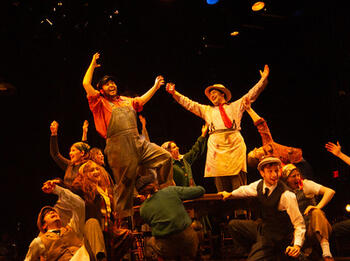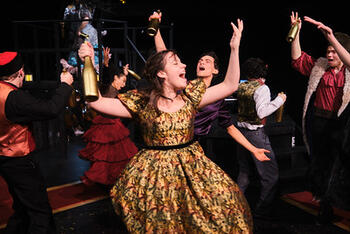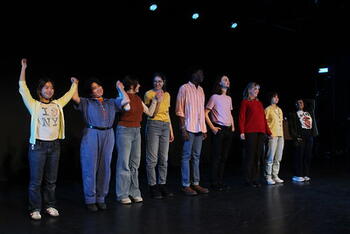Musical Theater Roadmap
The Producer of any student show serves as the key point-person for the production and is responsible for initiating and maintaining contact with the Undergraduate Production staff. The producer should begin by thoroughly reviewing the Undergraduate Production Regulations. The producer should be in touch with UP as early as possible in the planning process. This conversation should begin no later than four weeks before load in.
Important Steps for the Producer
Step 1: Secure the performance rights for any copyrighted material
- For musicals, you should begin the process of securing production rights in August of each year. Licensing companies can take several weeks to respond to your request, so it is important to begin this process early enough to secure materials for rehearsals. However, rights’ contracts do have an expiration date. Do not apply so early that your contract expires before you secure CPA funding to pay for the rights. (Applying at the beginning of the fall semester for a spring production is a great idea. Applying in the spring for a production that will occur in the fall or spring of the following year is way too early.)
- The Creative and Performing Arts Fund (CPA) is potential source of funding for your production and will cover up to $1000 of your rights costs. Many musicals have rights that exceed this amount. Through a generous gift, the Karetsky fund can cover any remaining rights costs above $1000. Please contact your UP advisor to request support from the Karetsky fund.
- When granted rights to perform a show you will need to return all rented materials to the rights holder immediately following your production. Please inform your team at the beginning of the process and make sure you retrieve all rental materials from your team members at closing.
- Proof of these rights must be submitted to UP in order to secure production approval. Please note: all requests for rights from MTI, Tams Witmark, and Rodgers and Hammerstein must be made through Undergraduate Production. If you would like a quote for rights held by these companies, please contact your UP advisor.
Step 2: Apply for funding and a venue
 Begin the process of applying for funding. Funds are available from a variety of campus sources, including the Undergraduate Organizations Funding Committee (UOFC) and the CPA. In order to apply for a UOFC grant, please use the UOFC Application Form which can be found on the Yale College Council (YCC) Orgsync platform. If possible, the CPA application should be submitted by the producer. You will need to carefully track your spending. The Producer Budget Worksheet is set up to help you track spending against multiple funding sources.
Begin the process of applying for funding. Funds are available from a variety of campus sources, including the Undergraduate Organizations Funding Committee (UOFC) and the CPA. In order to apply for a UOFC grant, please use the UOFC Application Form which can be found on the Yale College Council (YCC) Orgsync platform. If possible, the CPA application should be submitted by the producer. You will need to carefully track your spending. The Producer Budget Worksheet is set up to help you track spending against multiple funding sources.- Apply for a performance space. Application for most theater venues is integrated into the CPA application. It is not necessary to submit separate applications to individual theaters if you are applying for a CPA award. The application, along with additional information about the CPA Awards, may be found here.
- If you are not using the CPA application, contact UP as early as possible to start a conversation about your event.
Step 3: Obtain and complete the Production Application

As soon as you receive confirmation of funding from your Head of College and approval to use a space on campus, set up an appointment with one of the UP Technical Directors to discuss your project. The goal is to discuss the scope and scale of your project and establish a plan for realizing your vision. This appointment should take place no less than four weeks prior to the date you intend to load into a theater space, much earlier if you require approval for stage combat and/or weapons. As many of your production staff members as possible should attend.
Step 4: Secure your rights
You have not actually secured the rights to produce a show until your contract has been signed, returned and payment made. Please work with your awarding college office and UP advisor to ensure that these important steps are taken care of.
Step 5: Assemble a qualified staff
Your staff should include a stage manager, music director, choreographer, sound engineer, designers, technicians, assistants, and other roles specific to the needs of your production. A good way to recruit production staff members is to place announcements on the Yale Drama Coalition website and in the Yale Dramatic Association newsletter. During this time feel free to contact the UP staff for any guidance or assistance that you may need.
Looking for people who have already worked as TDs or Lighting Designers? Search by “Production Team Members & Roles” on the Yale College Arts website, then sort by year. Here are the lists for TDs and Lighting Designers.
Step 6: Pre-production
- A Content Advisory form should be created for your production, and shared with your production team. This should be a living document, and is designed to be updated as the production and the show evolve.
- Secure sound equipment not available in your venue. This can include things like wired and wireless microphones, and monitors. Speak with your UP advisor about your sound needs, schedule meetings between your production team members and UP advisor to ensure the things you want to do are possible and get help with resources to acquire items.
- Secure musical instruments required by the score that you musicians don’t already own. Sometimes a residential college may have what you are looking for. Check with the Head of College office to see what resources might be available. Check with your UP advisor to make arrangements to borrow equipment from UP and DGSD inventories. If you can’t find what you need on campus, UP also maintains a Vendor List of local service and equipment providers available to support your production needs.
- UP will notify you of the date and time of your required safety and fire inspection. Your Producer should be present for this inspection.
- Most college theaters are intended for theater workshops or relatively small productions/events that do not require construction or installation of fixed sets. Fixed sets or sets requiring substantial construction are not permitted in theaters without express permission from you UP Technical Director. If approved, scenery may be constructed, painted, or assembled only in certain authorized work areas on campus. Owing to the logistics required to use these spaces and to transport scenery between them, students are encouraged to employ only minimal, stylized scenic designs, or ideally to accomplish environments with lighting and projection.
Step 7: Load In / Production

A final check-in meeting with a UP staff member should take place two or three days prior to your load-in date to confirm that you are ready to load your show into the performance space. You are responsible for coordinating the efforts of all your staff members within the parameters of your approved plans. Depending upon the location, scope, and scale of your production, some of this work may require supervision by a UP Technical Director.
Given the varied and intense schedules of Yale College students, fatigue is a very real safety concern. Load in and tech are especially busy times. The entire production team share responsibility for prioritizing health and safety (and academic commitments). Producers and Stage Managers play a crucial role. Undergraduate Production recommends that no student work for more than 4 hours before taking a break of at least 30 minutes, that no work call total more than 8 hours, including breaks, and that work calls be separated by a rest period of at least 10 hour, and ideally 12 hours. In addition, please be aware that there is a firm curfew of midnight for all production activity, with the exception of strike, which may continue until 1am, or later with UP staff permission and supervision. Production activity includes meetings. Production teams should be exiting the theater or rehearsal room no later than midnight.
Step 8: Fire Inspection
Your Fire Code Compliance inspection will usually take place one or two days before your production opens, usually between 3:30 and 6:00 pm for week-long residencies. Some productions with no scenery (e.g. improv), or single day residencies will be inspected on the day that the production opens. The show Producer is required to be present for the inspection. Prior to your inspection you must hold a fire drill/evacuation with the entire cast and crew. Once accomplished, fill out the Fire Drill Log and have it available during your inspection. Any concerns identified during the fire inspection must be rectified prior to opening night.
Step 9: Strike and Post-Production
Immediately following the final performance your staff will begin striking your show from the theater by cleaning and returning the space to its original condition. Again, depending upon the location of your event and the scope of the project, portions of this work may require supervision by a UP Technical Director.
- Return all borrowed equipment, costumes, and props.
- Clean the booth, theater, backstage, and dressing rooms.
- Collect all copies of music and materials from your rental package to return to the rights holder.
Step 10: After-Strike

It is not safe to assume that items can be left in the theatre following your closing. Often, another group is loading into the space on the following morning and all of your materials should be cleared. If this is not possible, please notify your UP TD prior to your opening to see if it is possible to leave things, or if another space is available for storage over night. The day after your strike, return any remaining equipment, props, and any other borrowed or rented items. The producer may delegate these tasks, but they will be held accountable for their completion.
